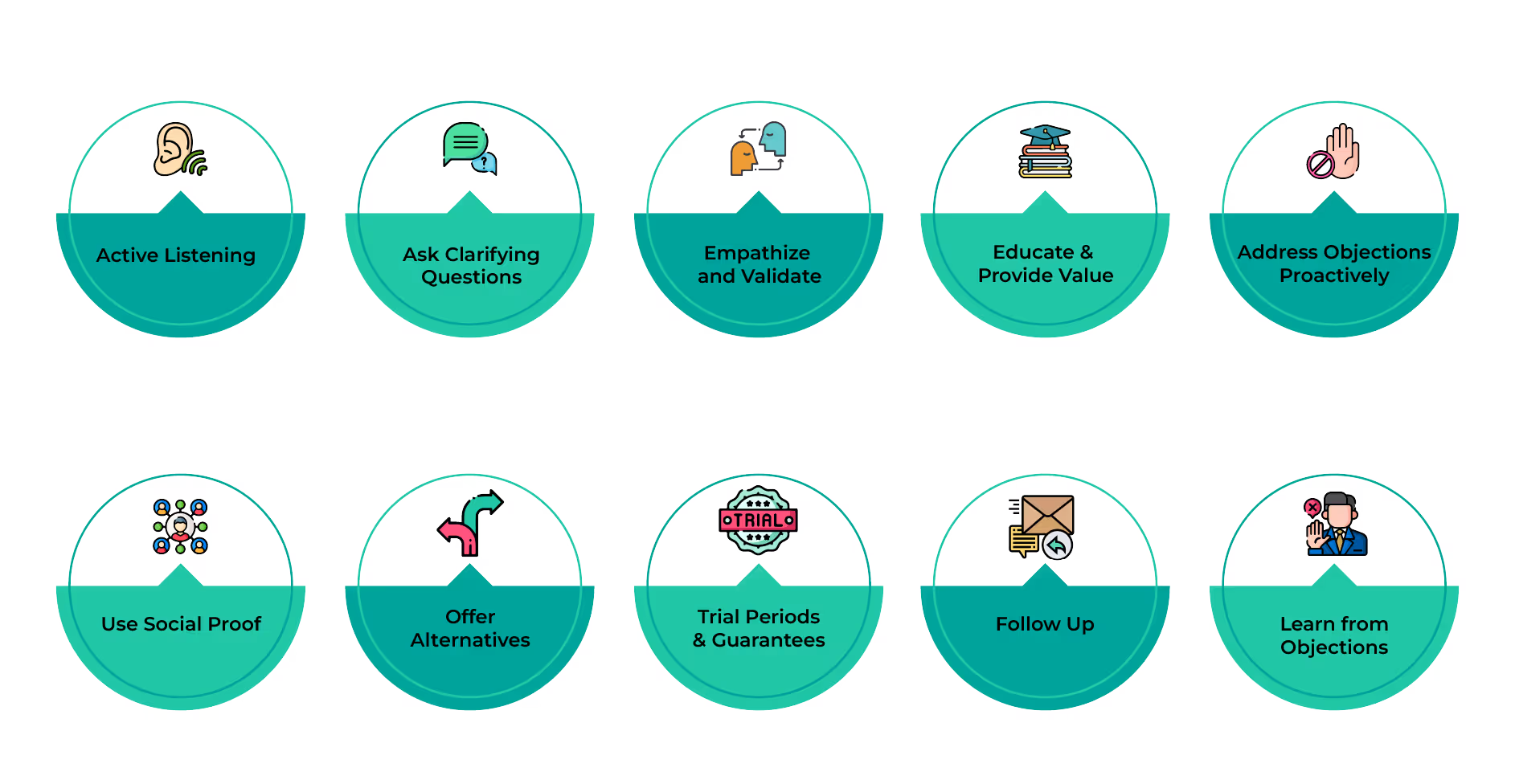
Blog
Understanding Sales Objection: Strategies for Success
October 6, 2023


Key Insights
Sales can be a challenging and rewarding profession. However, one of the biggest hurdles salespeople often face is resistance from potential customers.
Sales resistance can manifest in various forms, from skepticism and objections to outright rejection.
But fear not, as there are strategies and techniques you can employ to successfully overcome sales resistance and close deals!
In this blog, we'll explore some valuable tips to help you navigate these challenges and boost your sales effectiveness.
What is a Sales Objection?

A sales objection, often referred to simply as an objection, is a specific concern, question, or hesitation raised by a potential customer during the sales process. When someone expresses an objection, they are essentially communicating their doubts or reservations about making a purchase. The role of the sales team is pivotal in effectively addressing these objections and guiding the customer towards a successful sale.
Common :

- Price objections: Prospects may feel that the product or service is too expensive or beyond their budget.
- Product or service objections: This type of objection relates to concerns about the features, quality, or suitability of the product or service.
- Timing objections: Prospects might believe that it's not the right time for them to make a purchase due to various reasons, such as being busy or not having an immediate need.
- Competitor objections: Customers may compare your offering to that of a competitor and express doubts about why they should choose your product or service.
- Trust objections: Trust-related objections often involve concerns about the credibility, reliability, or reputation of your company.
- Objections based on misinformation: Sometimes, objections arise from misunderstandings or incorrect information about your product or service.
Salespeople need to listen actively to prospects' objections, acknowledge their concerns, and respond with persuasive and informative answers.
The goal is to overcome objections and build trust with potential customers, ultimately leading to a successful sale.
Why is Sales Objection Handling Important?
Handling sales objections is crucial for salespeople because it is a pivotal moment in the sales process where trust, credibility, and rapport are put to the test.
Objections from potential customers often arise due to doubts, uncertainties, or misconceptions about a product or service. By addressing objections effectively, salespeople not only demonstrate their expertise and product knowledge but also show a genuine commitment to meeting the customer's needs.
Overcoming objections can lead to a more informed and satisfied customer, ultimately increasing the likelihood of closing the sale. Moreover, adeptly handling objections can help build long-lasting customer relationships and establish a reputation for reliability, which can translate into repeat business and referrals. This can also be aligned with MBO compensation structures, incentivizing sales teams to excel in objection handling and customer satisfaction as part of their performance goals.
In essence, mastering the art of handling objections empowers salespeople to navigate challenges, drive conversions, and contribute to the overall success of their organization while also ensuring they can effectively manage their non-recoverable draw within the sales compensation structure.
Ways to Overcome Sales Objections:

Here are some ways to overcome sales objections and turn them into opportunities for successful sales:
- Active Listening
The first step in overcoming sales objections is to actively listen to the prospect. When a potential customer raises an objection, it's essential to hear them out without interrupting.
This shows respect for their perspective and allows you to fully understand their concerns. Once they've finished, you can address their objections more effectively.
- Ask Clarifying Questions
After listening carefully, ask clarifying questions to dig deeper into the objection.
Understanding the root cause of the objection can help you tailor your response.
For example, if a prospect objects due to budget constraints, ask about their budget range and what features or benefits are most important to them. This information will enable you to offer a more tailored solution, aligning with your incentive structure that rewards sales representatives for understanding and addressing customer needs effectively.
- Empathize and Validate
Empathy goes a long way in sales. Let the prospect know that you understand their concerns and validate their feelings. Statements like, "I can see why that might be a concern for you," or "It's completely normal to have reservations about this," can help establish rapport and trust.

- Educate and Provide Value
Once you've gathered information and empathized with the prospect, it's time to educate them on how your product or service can address their concerns and provide value.
Highlight the specific benefits that align with their needs and concerns. Use case studies, testimonials, or data to support your claims.
- Address Objections Proactively
Anticipating objections before they arise can give you a proactive edge. During your sales pitch, address common objections preemptively.
For example, if price is a common concern, explain the value proposition and cost savings of your product or service early in the conversation.
- Use Social Proof
Social proof is a powerful tool for overcoming objections. Share success stories from other clients or customers who faced similar objections but benefited from your product or service. This can help build trust and credibility.
- Offer Alternatives
If a prospect's objection is related to a specific aspect of your offering, explore alternative solutions. Maybe there's a lower-cost version of your product or a different package that better fits their needs.
Being flexible and willing to customize your offer can make a big difference.
- Trial Periods and Guarantees
Sometimes, prospects are hesitant to commit because they fear making a wrong decision. Offering trial periods, money-back guarantees, or satisfaction guarantees can ease their concerns and align with your sdr commission structure.
These assurances demonstrate your confidence in the value of your product or service.
- Follow Up
After addressing objections and providing information, don't forget to follow up with the prospect. Give them time to think it over and address any additional questions or concerns that may arise.
Persistence and continued communication can help you close the deal.
- Learn from Objections
Lastly, view objections as opportunities to improve your sales approach. If you repeatedly encounter the same objections, it may be a sign that your messaging or product needs adjustment.
Use objections as feedback to refine your sales strategy.
Overcoming sales objections is a crucial skill for any sales professional. Instead of viewing objections as roadblocks, see them as opportunities to connect with prospects, provide value, and build trust.
Read this blog for 9 Sales Rebuttals to Overcome Common Objections and Close More Deals.
By actively listening, empathizing, and tailoring your responses, you can turn objections into successful sales and long-lasting customer relationships.
Remember that objections are a natural part of the sales process, and with practice, you can become more adept at handling them effectively.
ReKennect : Stay ahead of the curve!
Subscribe to our bi-weekly newsletter packed with latest trends and insights on incentives.
Thank you! Your submission has been received!
Oops! Something went wrong while submitting the form.
Your data is in safe hands. Check out our Privacy policy for more info














